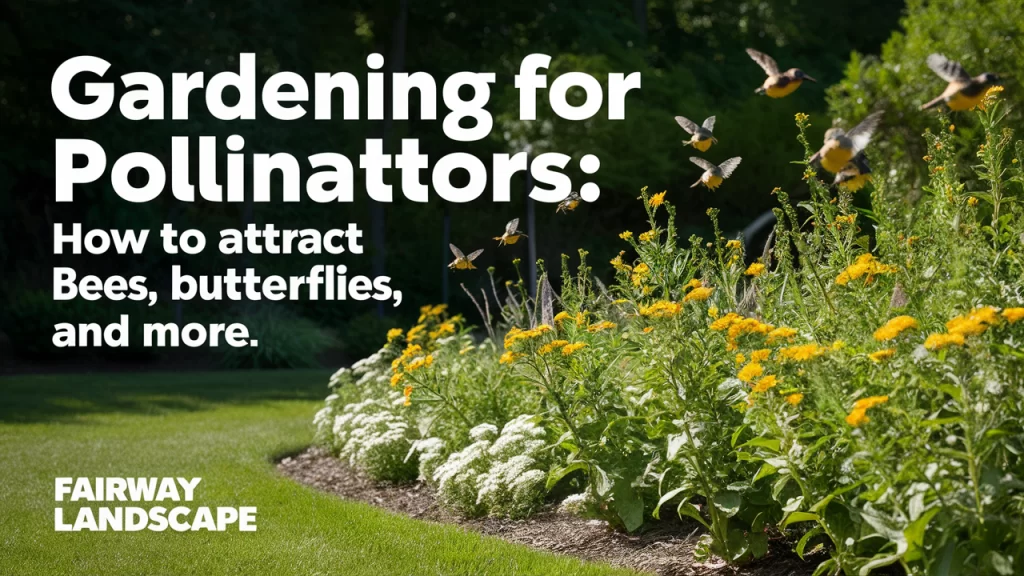Pollinators, such as bees, butterflies, and hummingbirds, play a crucial role in maintaining a healthy and thriving garden ecosystem. These tiny creatures help transfer pollen from one plant to another, enabling fertilization and the production of fruits, vegetables, and seeds. However, due to factors like habitat loss and pesticide use, pollinator populations have been declining in recent years. As gardeners, we have the power to make a difference by creating gardens that attract and support these vital organisms. This article will guide you through the process of designing a pollinator-friendly garden and provide tips on how to care for it throughout the seasons.

Benefits of Attracting Pollinators
Why Your Garden Needs Pollinators
Attracting pollinators to your garden offers numerous ecological and practical benefits. Here are some key reasons why your garden needs pollinators:
- Improved plant health and yield: Pollinators help ensure proper fertilization, leading to healthier plants and increased fruit and vegetable production.
- Enhanced biodiversity: A diverse array of pollinators supports a wide variety of plant species, promoting a more resilient and balanced ecosystem.
- Natural beauty: Colorful butterflies, buzzing bees, and graceful hummingbirds add visual interest and enjoyment to your garden.
By creating a pollinator-friendly garden, you not only support these essential creatures but also contribute to a healthier and more vibrant environment. To learn more about the benefits of native plants for pollinators, read our previous blog post: Why Native Plants are Essential for Pollinators.
Selecting Pollinator-Friendly Plants
Choosing the Best Plants for Pollinators
Selecting the right plants is key to attracting a variety of pollinators to your garden. Different pollinators have specific preferences, so it’s essential to choose a diverse array of plants that cater to their needs. Here are some plant suggestions for attracting various pollinators:
- Bees: Lavender, Salvia, Coneflower
- Butterflies: Butterfly Weed, Lantana, Zinnias
- Hummingbirds: Trumpet Vine, Fuchsia, Honeysuckle
When planting for pollinators, consider factors such as bloom time, color, and plant structure to ensure a continuous food source throughout the growing season. Fairway Landscape offers professional plant selection and installation services to help you create the perfect pollinator-friendly garden.
Creating Habitats for Pollinators
Designing Pollinator Habitats in Your Garden
In addition to providing food sources, it’s essential to create habitats and resources that support pollinators throughout their life cycles. Consider incorporating the following elements into your pollinator garden:
- Bee houses: Provide nesting sites for solitary bees by installing bee houses made from natural materials like bamboo or wood.
- Butterfly puddling stations: Create shallow dishes filled with sand and water to provide butterflies with essential minerals and moisture.
- Hummingbird feeders: Offer supplemental nectar sources for hummingbirds, especially during periods when natural flowers are scarce.
When designing your pollinator habitats, ensure they are located in safe, sheltered areas away from strong winds and predators. For more tips on creating a wildlife-friendly garden, check out our blog post: 10 Ways to Create a Wildlife-Friendly Garden.
Avoiding Pesticides and Chemicals
Maintaining a Safe Environment for Pollinators
Pesticides and chemical treatments can have devastating effects on pollinator populations. To maintain a safe and healthy environment for pollinators, consider the following eco-friendly alternatives:
- Organic pest control methods: Use natural predators, such as ladybugs or praying mantises, to control pest populations without harmful chemicals.
- Companion planting: Plant specific crops together that naturally deter pests or attract beneficial insects, reducing the need for chemical interventions.
- Natural repellents: Use organic sprays made from ingredients like neem oil or garlic to discourage pests without harming pollinators.
By adopting organic gardening practices and avoiding harmful chemicals, you can create a thriving, pollinator-friendly garden that benefits both the environment and your plants. For more information on organic gardening, read our previous blog post: The Beginner’s Guide to Organic Gardening.
Seasonal Care for Pollinator Gardens
Caring for Your Pollinator Garden Year-Round
To ensure your pollinator garden remains healthy and vibrant throughout the year, it’s essential to provide appropriate seasonal care. Here are some key tasks for each season:
- Spring: Plant new pollinator-friendly species, remove winter debris, and apply a fresh layer of mulch to suppress weeds and retain moisture.
- Summer: Water your plants regularly, deadhead spent blooms to encourage new growth, and monitor for any signs of disease or pest issues.
- Fall: Clean up your garden, remove dead or diseased plant material, and prepare habitats for overwintering pollinators.
By providing consistent care and attention throughout the seasons, you can maintain a thriving pollinator garden that supports these essential creatures year after year. Fairway Landscape’s garden maintenance services can help you keep your pollinator garden in top shape.
Creating a garden that attracts and supports pollinators is a rewarding and eco-friendly way to enhance your outdoor space. By selecting pollinator-friendly plants, designing habitats, avoiding harmful chemicals, and providing proper seasonal care, you can create a thriving environment that benefits bees, butterflies, hummingbirds, and countless other essential pollinator species.
If you’re ready to transform your garden into a pollinator paradise, contact Fairway Landscape today at (443) 206-0221 or visit our contact page to schedule a consultation with our experienced team of landscape designers and gardening experts.
